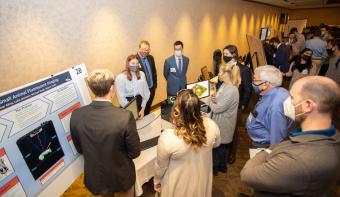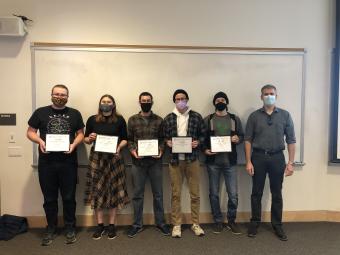Small Animal Fluorescent Imaging System wins first place in Fall 2021 Capstone Design Showcase
Student-designed projects tackle problems using engineering and technology solutions.

Members of the Small Animal Fluorescent Imaging System team present their project at the Fall 2021 Capstone Design Showcase.
The Small Animal Fluorescent Imaging System, an imaging system designed to be affordable for small universities and research centers who need to conduct niche research, took the top award at the Fall 2021 Capstone Design Showcase.
The winning team found a way to create an in vivo fluorescence imaging system at an accessible price, using a black acrylic and PLA structure, a Raspberry Pi and an acrylic lens. Only costing $367, the system is light-tight and allows users to adjust sample height and swap physical filters.
Sponsored by Kevin Cash, assistant professor of chemical and biological engineering, the team for the winning project included Allen DeGroot, Lydia Jameson, Kramer Kilroy, Michael Smith and Robert Smith. Yosef Allam, teaching associate professor of engineering, design and society (EDS), and Chris Coulston, teaching professor of electrical engineering, served as project advisers and consultants.

Two teams tied for second place: EduCAN and Aerial Drone for Wildfire Detection.
EduCAN created a modular device based on a sub-orbital compact satellite, for use by STEM educators in middle and high school. The team consisted of Galen Stevenson, Mia Donato, Sean Gilpatrick, Shu Ee Ong and Salwa Aletani, with advising and consulting by Adjunct Professor Antonie Vandenberge and EDS Professor Kevin Moore. The project was sponsored by the Colorado School of Mines Humanitarian Engineering Program.
Aerial Drone for Wildfire Detection created a prototype of a four-rotor drone, equipped with gimbal-mounted visual and thermal cameras, for ground crews to assess and understand wildfire risks. The team consisted of Josh Watson, Natalie Brooker, Tucker Vana and Joshua Callaghan, with advising and consulting by Allam, Civil and Environmental Engineering Professor John Spear and Mechanical Engineering Associate Professor Ray Zhang. The project was sponsored by Moore.
Third place went to Adaptive Saddle, an adaptive horse saddle designed to mesh with an existing saddle for use by individuals with varying disabilities while participating in equine therapy. Team members were Madi Flodquist, Marion Hohn, Alexa Kinch, Mason Pierce, Flint Sheffield and Lindsey Welch. Sponsored by the Mines Human Centered Design Studio, the Adaptive Saddle team was advised by EDS Teaching Associate Professor Chelsea Salinas, Mechanical Engineering Associate Professor Joel Bach and Adjunct Professor Susan Anderson.
Capstone projects were also recognized for their innovation, societal impact, proof of concept and websites:
- Best of Award for Innovation: Small Animal Fluorescent Imaging System
- Best of Award for Societal Impact: Tetra Pak, for Retos/Diversa
Team members: Jeanalee Schlabaugh, Tyler Quinn and Scott Crowner - Best of Award for Human Systems: Adaptive Saddle
- Best of Award for Proof-of-Concept: Backpackable Modular Trail Bridge, for Jeffco Open Space
Team members: Erik Allder, Torin Hopkins-Arnold, Isaak Johnson and Zachary Drennan
The Fall 2021 Broader Impact Essay winners were:
- First place: Galen Stevenson for “The Unseen Cost of Green”
- Second place: Andrea Gonzalez for “Nuclear Powers of the Future”
- Third place: Benjamin Selph for “Safety or Convenience: The Unprecedented Risk of Cloud-Based Infrastructure”




